How watching lockdown football differs across Europe's major leagues
- Published
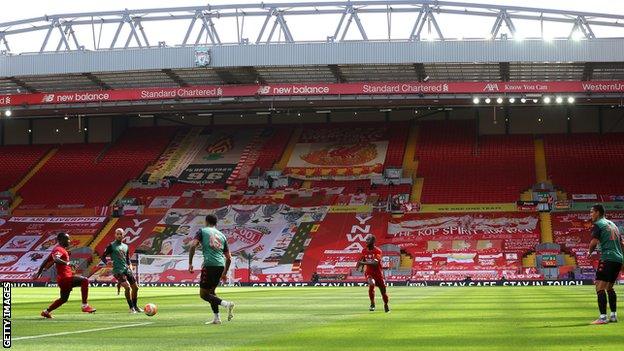
Up to 2,000 fans were allowed in some Premier League grounds, depending on the severity of the coronavirus restrictions in the area at the time
For almost a year, the routines and rituals of matchdays across Europe have been lost.
That is not just the case for stadium-going regulars, but also for those supporters who ordinarily follow games from home.
The five major European leagues have adopted different approaches to keeping fans interested. So which of these are working best? Journalists from across Europe give their views.
Ligue 1 - 'It has become inaccessible'
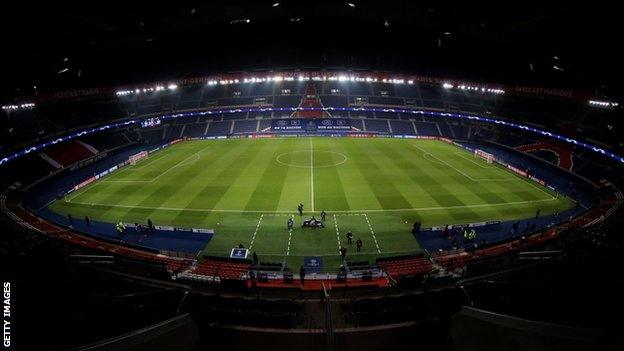
Mauricio Pochettino has taken charge of Paris St-Germain this season but has yet to experience a proper welcome from fans because of restrictions
In France, lockdown has coincided with a TV broadcasting rights crisis. Ligue 1 is not a universally popular product - even domestically - and the most recent four-year rights agreement with Mediapro has collapsed after just five months.
"It is impossible to talk about Covid's impact without mentioning the television rights crisis - they are linked," said Paris-based Jonathan Johnson of CBS Sports.
"The loss of spectators is an obvious issue because so many clubs live hand to mouth on matchday income, TV money and transfers. Mediapro has massively exacerbated that."
Concerns about the television rights contract surfaced soon after the season started. In October, Mediapro chief executive Jaume Roures insisted his company would not walk away, but made clear a desire to renegotiate terms because of the pandemic.
"No-one could have predicted the social and economic effects of Covid-19," Roures said. "This has led to us seeing with the LFP [French football's governing body] how we can adapt to the situation, without calling into question the commitment we made in April 2018."
In December, LFP released a statement saying the Mediapro deal had ended,, external with the broadcaster only committed to showing matches until January, and with Canal Plus negotiating to take over the rights.
"French football is being forced to modernise," Johnson added. "It has never really been about the event of watching a match on TV or in the stadium, more about getting people interested in the product.
"Many turn away from Ligue 1 because they believe it is inferior to other leagues. However, now there is nowhere to watch free-to-air football. Ligue 1 is inaccessible to many an average French person."
Premier League - 'Saturday football is no longer an event'
With fans absent from stadiums, the Premier League and television companies responded to a clamour for supporters to be able to watch every match by making all games available to view.
The rights in the UK are split between Sky Sports, BT Sport, Amazon Prime and the BBC - with the first three broadcasters running subscription packages, and the latter funded by a licence fee. For a short period this season, some matches were also shown on a pay-per-view basis, but that system was scrapped in November, with all games now split between the four rights holders.
Weekend kick-off times have been spread across Friday, Saturday, Sunday and Monday, aided by the rule barring Saturday 15:00 GMT matches from being broadcast live being lifted.
Rory Smith, soccer correspondent for the New York Times, believes this has fed the disconnect between football and fans over recent months.
"I get why every game has its own TV slot, to maximise audiences," he said. "[The issue] struck me over Christmas. On Boxing Day and New Year's Day, you expect there to be pretty much a full schedule of games built around a central kick-off time and there weren't; there were six on Boxing Day and only two on New Year's Day. They just felt like all the other days."
"In the Premier League, that sense of something interesting happening on Saturday afternoons has been lost because they've split the schedule.
"That has two effects; it removes football as an event - the centrepiece of the weekend is Saturday afternoons, and it turns it into wallpaper. I watch less football, because there is no event. It is much harder to keep track of than if it were condensed."
Serie A - 'No time to build up to games'
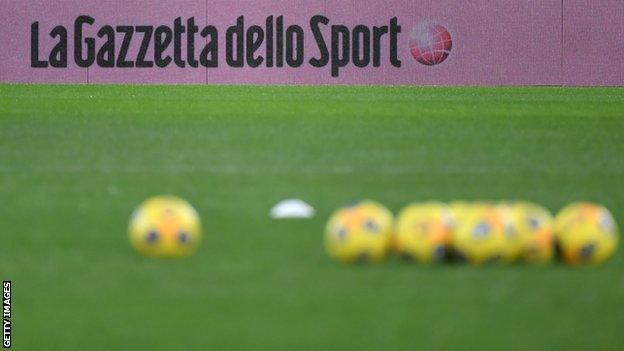
With fans absent Juventus are facing a first failure to win Serie A in a decade
Italian football has attempted to maintain a structure, with matchdays centred around the usual slot of Sunday at 15:00 local time, though the pandemic has forced a slight reshuffle.
But because the in-ground atmosphere and newspaper coverage, which is specifically dedicated to sport, are so key to the spectacle in Italy, it is suffering according to Turin-based journalist Adam Digby.
"They now have a Sunday lunchtime kick-off in Italy, plus two on Sunday evening and three on Saturday," Digby said. "Every game is televised.
"Because there are midweek games almost every week now, the big games take you by surprise.
"There is usually a full week of build-up in Gazzetta dello Sport. The Italian newspapers are so iconic, and they get into a real routine. On the Monday, you'd get that reaction to the weekend, then it was about what it meant on the Tuesday, then attention turned to the next weekend.
"But now, there is no time for anything to build. It is even difficult with the league table because it changes all the time."
La Liga - 'People would like more certainty over kick-off times'
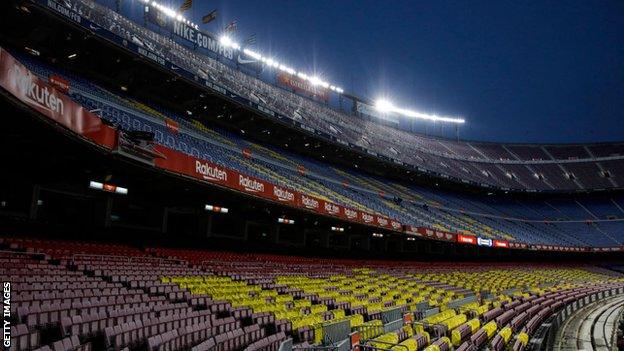
Barcelona have struggled so far this season without their fans
Staggered kick-off times were a feature of Spanish football long before lockdown, though there is a clamour to implement a central slot, as exists in England.
Broadcasting has long had its issues in Spain, with the schedule often being decided just days before the action kicks off.
"It used to be that 5pm on a Sunday was the sacred kick-off time and would see four or five games at once, but it hasn't been that way for a few years," says Sam Marsden, Barcelona correspondent for ESPN.
"There's been no uproar like in England because they already have 10 different slots. I can see why it is a nice idea to be able to watch the games, though when I was covering La Liga as a whole it felt pressurising that there were games on all weekend.
"If Eibar, Real Betis or Osasuna were playing at the same time, I would make time to follow those games, especially if there was a Soccer Saturday or Final Score-type goals show. I kind of lose track because of the different slots.
"From clubs like Rayo Vallecano, there have been complaints about where their fixtures are placed. I think people would like to see more certainty, especially during lockdown when they can't go to the stadium."
Bundesliga - 'The same emotions are still awoken by watching it'
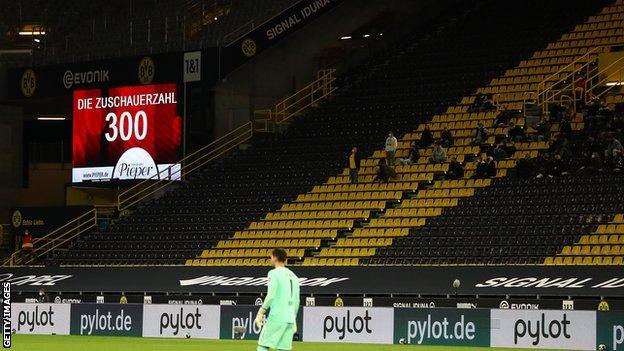
Borussia Dortmund's attempts to topple champions Bayern Munich are not being helped by the absence of their vociferous fans
German football has navigated its way through the pandemic relatively serenely and was one of the world's first leagues to allow fans back into stadiums, external.
Their regular 15:30 Saturday kick-off slot has remained, maintaining the sense of structure and keeping that sense of event that, according to Smith, has been lost in England.
"Covering it is still an event and I know friends are still following it," says German football writer Archie Rhind-Tutt. "The same emotions are still awoken by watching it. The event is still there because the kick-off times have stayed the same.
"The ultras aren't happy about this - they aren't for 'Geisterspiele' [ghost games] as they call it. But for football to continue in its current state, they need to play for the money to be there."

Mark Wright's Last Chance: He's made his debut now can he keep a spot in the team?
Secrets of Cinema: How British comedy kept us all laughing
